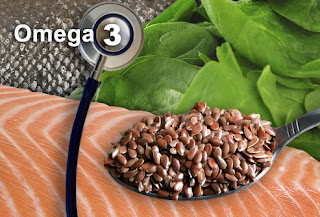Good for the heart and vessels:
Twice a week, eat whose fatty fish at least once. If you follow this advice, you will get enough omega-3 fatty acids. And that is important for your heart and your blood vessels.It remains a difficult story to gain fats. Roughly you can say that saturated fats are bad for you and most unsaturated fats properly. One of the various unsaturated fats is omega-3 fatty acids (or to be more precise n-3 long chain fatty acids).
EPA and DHA:
Omega-3 fatty acids are various fatty acids. It includes mainly alpha-linolenic acid (ALA), eicosapentaenoic acid (EPA) and docosahexaenoic acid (DHA). EPA and DHA are namely fish. Pisces, one kind of substances can be getting from algae.Heart and vessels:
Where most unsaturated fatty acids have a positive effect on your cholesterol and saturated fatty acids have a negative effect. Omega-3 fatty acids have no effect on your cholesterol levels. However, they have a beneficial effect on many risk factors for heart disease. They are such inflammatory reactions and they have a positive effect on heart rate. Omega-3 fatty acids are so healthy for your heart and blood vessels.Especially the risk of sudden cardiac arrest decreases when you have enough omega-3 fatty acid intakes. You have Also less chance of a stroke. These health benefits are even greater if you ever had a heart attack or stroke had.
Twice a week fish:
The official advice for adults is to take at least 450 milligrams of omega-3 fatty acids per day to. This volume gives you all if you eat fish twice a week, at least once oily fish. Oily fish should think of herring, mackerel, sardines and salmon. It contains all larger amounts of EPA and DHA than in lean fish such as cod and Pollock.If you eat more than 450 milligrams per day, it will not provide additional health benefits. It is better for people at high risk for cardiovascular disease or who have had a heart attack or stroke had. But for most people delivers more than twice a week fish so no extra health benefits.
Meat and egg:
Most omega-3 fatty acids are found in fish. EPA and DHA are found almost only in fish. But are omega-3 fatty acids are also found in green vegetables and meat. In grass and other food that animals eat, also contain omega-3 fatty acids. In this way, there are also some omega-3-fatty acids in the egg.Furthermore, more and more products which contained omega-3 fatty acids such as margarines, breads and meats have been added on the market. Fish oil capsules are being sold in markets which have fatty acids in it. Therefore, it is always best to get omega-3 from fish to catch.
Omega-3 is not harmful:
Omega-3 fatty acids are completely safe. It is true that the main source of fish, frequently negative in the news because of harmful substances such as dioxin and mercury. Eating some fish, such as swordfish and fresh tuna would be harmful.But the highest European food safety agency, EFSA says that if you eat varied fish, there is no risk. Exchange swordfish or fresh tuna with other species. Only eel from Dutch rivers you should not eat, because an excessive amount of dioxin. But the omega-3 fatty acids in themselves are not harmful.
Children and Omega 3:
Children's brains are developing fast. Every day they learn new things. For good mental and physical development of your child, sufficient omega-3 is important. It helps children to concentrate better and it is good for their memory. But children are not always fond of fish. As a dietary supplement, one would therefore be able to choose an omega-3 supplement (fish oil capsules) for children.Incoming Searching Terms and Tags:
- omega-3 fatty acids supplements
- omega 3 fatty acids sources vegetarian
- benefits of omega 3 fatty acids weight loss
- omega 3 dha weight











